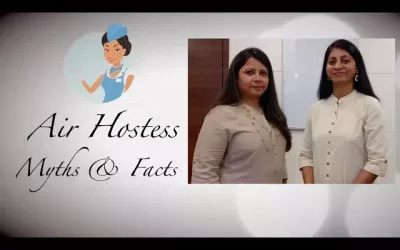Unearthing the Past: Navigating a Career in Archaeology
 Career in Archaeology. Nidhi Mishra in this episode speaks on a career in Archaeology. Every culture and civilization has its own history. This history is often not clearly known to their people.
Career in Archaeology. Nidhi Mishra in this episode speaks on a career in Archaeology. Every culture and civilization has its own history. This history is often not clearly known to their people.
Archaeologists study this and this field. Archaeologists mainly try to find out the famous four Ws (What, When, Why, Where, and How) with respect to the formation of past cultures and civilizations.
They also try to figure out the reasons behind major changes that have occurred in certain traditions and societies. Under this, they try to figure out the reasons why ancient man gradually stopped hunting and started farming and what may have prompted them to build cities and trade channels.
Most people picture archaeologists digging up earth with tools around them, but archaeology is much more than that. It has several branches like
• Historic Archaeology
• Maritime Archaeology
• Urban Archaeology
• Epigraphy
• Museology
To become an archaeologist, you need to have studied history on 10 + 2 followed by graduation in history and further do your Masters i.e. M.A. in Archaeology, Anthropology or Ancient Indian History. Some institutes may offer M.Sc in Archaeology or Anthropology. Depending on the institutes you may have to clear relevant entrance exams to seek admission for the Master’s Course.
Along with the educational qualification, there are certain skill sets required to become an archaeologist such as perceptive and probing mind, keen observation, and analytical and logical thinking. They must also possess creativity, and accuracy and should be able to recognize and appreciate arts.
They should be adaptable to physical stress and strain since they may have to work outdoors sometimes in uncomfortable conditions. Besides dedication, a lot of patience is required since research in this field can take years on one project.
A variety of opportunities for archaeologists are available in museums, research institutes, educational institutes, and tour companies. However, if one wants to join some government organization, they have to take up an examination conducted by the Union Public Service Commission or Staff Selection Commission. Archaeology can be a great career. Many aspects of the job are fascinating because of the exciting discoveries that can be made.
This field still needs people with ideas and enthusiasm – people who are in love with the venture of discovering the past, and who wish to share and communicate their enthusiasm. If you are one of these then archaeology is the field for you.
Frequently Asked Questions For Career In Archaeology
1. What is a career in archaeology all about?
A career in archaeology involves studying and uncovering artifacts, structures and remains from ancient civilizations to understand their history, culture, and way of life.
2. What qualifications do I need to become an archaeologist?
A bachelor’s degree in archaeology, anthropology, history, or a related field is typically the starting point. For advanced roles, a master’s or doctoral degree might be required. Practical experience through fieldwork and internships is also valuable.
3. What skills are essential for success in archaeology?
Key skills include attention to detail, research skills, critical thinking, patience, fieldwork proficiency, data analysis, communication, and an understanding of cultural and historical contexts.
4. What types of archaeology careers are available?
Archaeology offers various career paths, including academic research and teaching, cultural resource management, museum curation, archaeological consulting, public archaeology, and heritage management.
5. Do I need to travel frequently for fieldwork?
Fieldwork is a fundamental aspect of archaeology, often involving travel to excavation sites. Depending on your specialization, this could range from local projects to international expeditions.
6. What is the job outlook for archaeologists?
Job opportunities can vary based on factors like geographical location, funding availability, and cultural preservation efforts. While the field is competitive, demand remains for well-trained archaeologists.
7. How do I gain practical experience in archaeology?
Participating in fieldwork, internships, and volunteer opportunities is crucial for hands-on experience. This helps you develop field skills, network with professionals, and build a strong resume.
8. Is archaeology only about excavations?
No, archaeology encompasses various aspects, including archival research, artifact analysis, site preservation, public engagement, and contributing to our understanding of the past through a multidisciplinary approach.
9. Can I specialize in a particular area of archaeology?
Absolutely, specialization allows you to focus on areas like historical archaeology, underwater archaeology, prehistoric archaeology, forensic archaeology, cultural heritage management, or specific geographic regions.
10. What role does technology play in modern archaeology?
Technology such as Geographic Information Systems (GIS), 3D scanning, remote sensing, and digital documentation methods have revolutionized archaeological research, analysis, and preservation.
11. Are there opportunities for collaboration with other professionals?
Yes, archaeology often involves collaboration with experts from fields like anthropology, geology, biology, chemistry, history, and more to gain a holistic understanding of archaeological contexts.
12. How do I communicate my findings to the public?
Public engagement is vital. Archaeologists often share their research through academic publications, public talks, museum exhibits, educational programs, and even social media to make historical knowledge accessible.
13. What ethical considerations are important in archaeology?
Respecting the cultural heritage and descendants of the communities being studied is paramount. Ethical archaeology involves proper site preservation, consultation with stakeholders, and ethical treatment of human remains.
14. Can I work in archaeology with a passion for history and culture but no formal degree?
While a degree is often preferred, some entry-level positions might be available for individuals with related experience or those working under the guidance of experienced archaeologists. However, formal education enhances credibility.
15. How can I contribute to preserving archaeological sites and artifacts?
Supporting heritage preservation organizations, participating in community outreach programs, and advocating for responsible tourism and site protection are ways to contribute to preserving our shared history.






